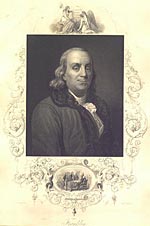

The British regime
The surrender of Montréal, on September 8, 1760, marked the end of New France and the beginning of a new era. After the victory, the British imposed a military regime between 1760 and 1764. The colony officially became the province of Québec.
The links with the French metropolis being broken, the control of the economy was now in the hands of English merchants who were opposed to Catholics being given administrative positions and asked for the application of British laws. The royal Proclamation of 1763 was in their favor. The balance was restored in 1774 by the adoption of the Québec Act which saw the return of French civil laws.
In 1775, the tension between the thirteen colonies of New England and Great Britain moved to Montréal, whereas the American army occupied the city until its withdrawal the following year. Benjamin Franklin, on mission in Montréal, sought to convince Canadians to support the revolt of the American colonies against the British crown, but without much success.
In 1791, England divided the province of Québec into two entities, Lower Canada and Upper Canada, each with its constitution. Lower Canada was now responsible for managing the whole territory. Montréal was, at the beginning of the 19th century, the centre of the fur trade and also of the expansion of rural entities.
















